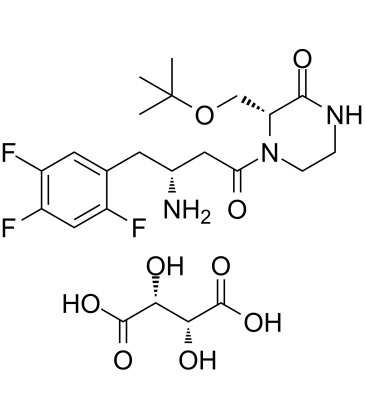1222102-51-3
| Name | Evogliptin tartrate |
|---|
| Description | Evogliptin tartrate is a potent, orally bioavailable and selective dipeptidyl peptidase-4 (DPP-4) inhibitor, with antidiabetic activity. Evogliptin tartrate has potential for anti-atherosclerosis therapy that targets arterial inflammation[1]. |
|---|---|
| Related Catalog | |
| Target |
DPP-4[1] |
| In Vitro | Evogliptin tartrate significantly inhibits the TNF-α-mediated induction of ICAM-1 and VCAM-1 expression in a concentration-dependent manner (IC50 = 0.30 and 0.25 μM, respectively)[1]. Evogliptin tartrate inhibits the TNF-α-mediated transcriptional activation of ICAM-1 and VCAM-1[1]. Evogliptin tartrate inhibits inflammatory responses via suppression of adhesion molecules induced by TNF-α. And TNF-α-mediated activation of NF-κB is ameliorated by evogliptin via the interaction of NF-κB with SIRT1[1]. Cell Viability Assay[1] Cell Line: Endothelial cells Concentration: 0.1 μM, 0.3 μM, 1 μM, 3 μM Incubation Time: 12 hours Result: Inhibits TNF-α-mediated (10 ng/ml) expression of adhesion molecules. |
| In Vivo | Evogliptin tartrate (37.5-150 mg/kg; p.o.; daily; for 12 weeks) reduces the high-fat diet-induced atherosclerotic plaque area in the ApoE−/− mouse model[1]. Evogliptin tartrate inhibits the formation of atherosclerotic lesions by reducing vasoinflammation and increases plaque stability[1]. Animal Model: ApoE−/− mice[1] Dosage: 37.5 mg/kg, 75 mg/kg, 150 mg/kg Administration: Oral administration; daily; for 12 weeks Result: Inhibit the development of atherosclerosis. |
| References |
| Molecular Formula | C23H32F3N3O9 |
|---|---|
| Molecular Weight | 551.51 |
